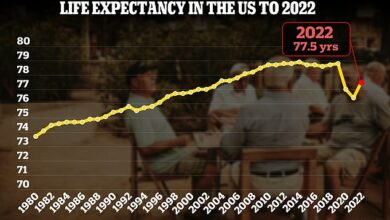Research shows ‘serious health consequences’ for people who eat after 5pm


Doctors have long advised people trying to lose weight to stop eating after the sun sets, making lunch the heartiest meal of the day.
Now researchers from Universitat Oberta de Catalunya (UOC) and Columbia University can point to another big benefit of this advice for metabolic health, showing that eating at least 45 percent of your daily calories after 5 p.m. hinders the body’s ability to regulate. blood sugar levels.
Eating later in the evening can drastically increase the risk of developing diabetes.
Their findings could provide some scientific validity to the intermittent fasting diet, which discourages eating later in the evening.
About 10 percent of Americans use intermittent fasting as a diet. Fans of this approach typically limit daily eating to a six-hour period per day, such as from 11 a.m. to 5 p.m.
And people who practice intermittent fasting consume most of their calories earlier in the day.
One of the co-authors of the study, Dr Diana Díaz Rizzolo, said: ‘The body’s ability to metabolize glucose is limited at night, because the secretion of insulin is reduced and the sensitivity of our cells to this hormone decreases as a result of the circadian rhythm. which is determined by a central clock in our brain that is tuned to the hours of daylight and night.’

People who consume 45 percent or more of their daily calories after 5 p.m. are less able to regulate their blood sugar levels, which over time can increase their risk for diabetes
The studypublished in Nutrition and Diabetes, included 26 people aged 50 to 75 years old who were overweight or obese and had prediabetes or type 2 diabetes.
People were divided into two groups: early eaters and late eaters. They ate the same food and the same amount of calories, just at different times of the day.
Those who ate more after 5 p.m., the later eaters, had higher glucose levels after a glucose test, indicating poorer glucose tolerance.
Meanwhile, intermittent fasting has been shown to significantly improve the body’s ability to effectively use glucose from food and use insulin to control blood sugar levels, in part because it encourages people to stop eating relatively early, around 5 p.m. for the day.
By limiting the eating window and increasing the time without food, the body can process glucose better and more efficiently.
Researchers added that foods typically eaten late at night are higher in calories and often processed, “which could explain why eating late is associated with greater body weight and fat mass.”
Dr. Díaz Rizzolo said: ‘Until now, personal dietary decisions have been based on two main questions: how much to eat and which foods to choose.
‘With this study, a new factor in cardiometabolic health is becoming increasingly important: when we eat.’
In addition to typically eating unhealthy foods in the evening, late eaters have been shown to burn calories more slowly. Their bodies also showed signs of promoting fat storage and reducing fat breakdown, which can lead to increased fat growth, according to a Harvard University study study.
In the weeks leading up to the Harvard study, 16 overweight or obese people followed fixed sleep and eating schedules. Each participant experienced early meals and late meals, allowing the researchers to examine the effects of meal timing on the same people.
The results showed that eating late reduced leptin, the hormone that signals fullness and affects appetite-regulating hormones, making participants feel hungrier over time.
These changes could potentially influence the risk of developing obesity, which is a major risk factor for type 2 diabetes.




